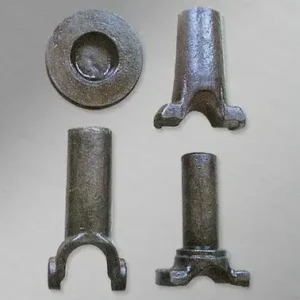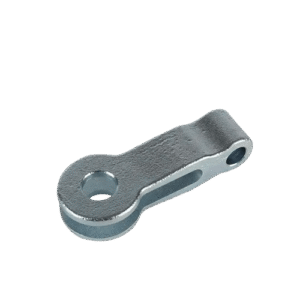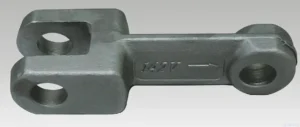Table of Contents
Custom Stainless Steel Forging: A Comprehensive Guide
Stainless steel forging is a specialized metal-forming process that combines exceptional strength, corrosion resistance, and design flexibility. It is the preferred manufacturing method for critical components that must perform reliably in demanding environments. This guide delves into everything you need to know about stainless steel forging, from materials and benefits to applications and our custom capabilities.

What is Stainless Steel Forging?
Stainless steel forging is a manufacturing process that involves shaping solid stainless steel billets or bars into high-strength components using localized compressive forces. The metal is heated to a specific temperature (typically between 1,700°F and 2,300°F / 927°C and 1,260°C) and then hammered, pressed, or rolled into the desired shape.
This process refines the metal’s internal grain structure, aligning it to follow the part’s geometry. This results in a product with superior mechanical properties—including enhanced toughness, impact resistance, and fatigue strength—compared to parts made by casting or machining from bar stock. Forging effectively creates a one-piece component with no internal voids or porosity, ensuring maximum structural integrity.

Common Stainless Steel Forging Materials
The choice of stainless steel grade is critical and depends on the application’s requirements for corrosion resistance, strength, and temperature tolerance. The most commonly forged grades include:
Austenitic Stainless Steels
304/304L: The most widely used stainless steel. Excellent corrosion resistance, good formability, and weldability. Ideal for food processing, chemical containers, and architectural applications.
316/316L: Offers superior corrosion resistance, particularly against chlorides and acids, due to the addition of Molybdenum. Often called “marine-grade stainless,” it’s used in marine environments, pharmaceutical, and chemical processing equipment.
321: Similar to 304 but stabilized with Titanium for improved resistance to intergranular corrosion after exposure to high temperatures. Common in aerospace and high-temperature applications.
Martensitic Stainless Steels
410: A general-purpose martensitic steel offering good strength, moderate corrosion resistance, and the ability to be heat-treated to high hardness. Used for valves, pumps, shafts, and cutlery.
420: Higher carbon content than 410, allowing for greater hardness and wear resistance after heat treatment. Ideal for surgical instruments, molds, and bearing components.
Precipitation-Hardening (PH) Stainless Steels
17-4PH (630): A versatile grade that can be heat-treated to very high strength levels while maintaining good corrosion resistance and toughness. It is exceptionally forgeable and widely used in aerospace, defense, and high-stress mechanical components.
15-5PH: Offers similar properties to 17-4PH but with better transverse toughness and ductility. Preferred for critical aerospace and military components.
Duplex Stainless Steels
2205: Features a mixed austenitic-ferritic microstructure, providing roughly twice the yield strength of 300-series steels and excellent resistance to stress corrosion cracking. Ideal for offshore oil & gas, chemical tankers, and pressure vessels.
Industries and Applications for Stainless Steel Forgings
The unique combination of strength, corrosion resistance, and reliability makes stainless steel forgings indispensable across a wide range of industries:
Aerospace & Defense: Landing gear components, engine mounts, turbine disks, flight control fittings, and missile parts.
Oil & Gas: Valve bodies, wellhead components, Christmas tree fittings, drill bits, and subsea equipment.
Automotive: Crankshafts, connecting rods, gear blanks, wheel hubs, and turbocharger components.
Medical & Surgical: Implantable device bodies, surgical instrument jaws, forceps, and bone reamers.
Food & Beverage Processing: Mixing shafts, valve and pump bodies, fittings, and equipment that requires easy cleaning and sanitization.
Chemical Processing: Reactor vessels, agitators, pump impellers, and piping systems handling corrosive media.
Power Generation: Turbine blades, fasteners, and valve components for nuclear, fossil fuel, and renewable energy plants.
Marine & Shipbuilding: Propeller shafts, rudder stocks, deck hardware, and fittings exposed to seawater.

Key Benefits of the Stainless Steel Forging Process
Choosing forged stainless steel components offers numerous advantages over other manufacturing methods:
Superior Strength and Toughness: The forging process aligns the grain flow, eliminating porosity and creating a continuous grain structure that significantly enhances the part’s impact and fatigue strength.
Excellent Corrosion Resistance: The inherent properties of stainless steel are fully retained and often improved through grain refinement, making forgings ideal for harsh environments.
Economic Efficiency: While initial tooling costs may be higher, forging is highly cost-effective for medium to high-volume production. It also minimizes material waste compared to machining from solid bar stock.
Reliability and Structural Integrity: The absence of internal voids, cold shuts, or other defects common in castings ensures a highly reliable part with predictable performance under load.
Versatility in Design: Forging can produce a vast range of complex shapes and sizes, from a few ounces to several tons.
Important Considerations in Stainless Steel Forging
To ensure a successful project, several critical factors must be addressed:
Material Selection: Choosing the correct grade is paramount. Factors like operating temperature, chemical exposure, and required mechanical strength must guide the selection.
Forging Temperature Control: Precise control of the heating and forging temperature is crucial. Overheating can cause grain growth or burning, while under-heating can lead to cracking or excessive die wear.
Die Design and Maintenance: The quality of the forging dies directly impacts the final part’s dimensional accuracy, surface finish, and production efficiency. Proper die design and regular maintenance are essential.
Post-Forging Heat Treatment: Processes like annealing, quenching, and tempering are often required to achieve the desired mechanical properties, relieve internal stresses, and enhance corrosion resistance.
Quality Control and Testing: Rigorous inspection, including dimensional checks, liquid penetrant testing, ultrasonic testing, and mechanical property verification, is necessary to guarantee part quality.
Custom Stainless Steel Forging Services: We Meet Your Exact Requirements
we specialize in providing fully custom stainless steel forging solutions. We understand that every project is unique, and we have the expertise and capability to bring your specific designs to life.
Our Custom Forging Capabilities Include:
Collaborative Design Support: Our engineering team works with you from the concept stage to optimize your design for the forging process, ensuring performance and manufacturability.
Wide Range of Materials: We forge all standard stainless grades (304, 316, 410, 17-4PH, etc.) and can source specialty alloys to meet your specifications.
Flexible Production Volume: We accommodate projects of all sizes, from low-volume prototype runs to high-volume production orders.
Comprehensive Secondary Services: We provide a full suite of value-added services, including precision machining, heat treatment, surface finishing (passivation, pickling, polishing), and non-destructive testing.
Stringent Quality Assurance: Our commitment to quality is unwavering. We are certified to [Insert relevant standards, e.g., ISO 9001, AS9100, NADCAP] and provide full material and process traceability.
Ready to get started on your custom forged component? Contact our experts today to discuss your project requirements and receive a detailed quotation.
